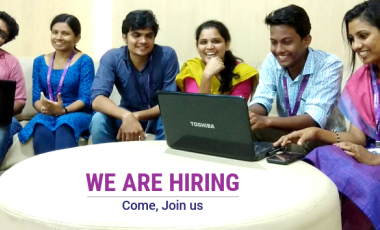Automation in the HR Domain: How it’s Paving the Path for Digital Transformation
Pandemic has compelled digital transformation (DX) for most industries, making DX a "must-have" thing rather than a "nice-to-have" one.
But embracing new operations methods came with its own set of challenges for each domain, and HR is no exception.
While acquiring the right talent has always been one of the biggest challenges of HR, they now have the onus of maintaining culture, employee engagement, hiring, retention, or laying off during the work from home scenario. That's an entire set of added challenges no one would have envisioned.
But there's a silver lining.
Automation is an opportunity disguised as a mandatory change. Suppose HR professionals embrace these new changes and remodel the hiring process. In that case, they could elevate their roles and become strategic partners to drive an in the organization.
So in this blog, we'll touch more on HR’s roles, discuss whether automation and DX are the same and what changes automation can bring to the HR domain.
Is Automation Different from Dx?
Digital transformation is the right mix of key elements, of which the two most important ones are:
As important as it is to have the right set of employees and retain them, it is to acquire the right tech stack.
is the road to a successful digital transformation.
So by embracing automation, HR teams can drive organizational change and play a direct role in achieving the company's DX goals like capturing a new market segment, starting a new revenue stream, and more.
One thing to note here is that DX never takes place in a silo; it's a continuous process that's successful when the entire organization works towards a common goal. That makes them even more critical -- to hire the right talent, retain them, foster communication and culture, and ensure business continuity.
An employee engagement report by G2 [1]shows that
"80% of HR employees implemented HR technologies to improve employee attitudes."
Finally, transformation is not possible when the company's resources are tangled in repetitive, tedious, and manual tasks that are better performed when handed over to the bots. So let's take a look at some benefits of automation in the HR domain.
Significance of Automation in the HR domain
Research shows that HR managers lose 14 hours [2] a week due to a lack of automation! Time is a costly asset for the company they can't afford to lose; hence, automation eliminates manual work by letting the bots work faster and more successfully.
Automation can be created in multiple ways -- end-to-end automation of the recruitment process or delegating some parts of the hiring process to bots. Ideally, HR professionals prefer preserving the human element as the entire process would otherwise become cold.
1.Effective Hiring
A team with all the required skill sets is the backbone of every organization. However, with growing business needs, there are often multiple positions open at once, leading to hiring at scale. Automation can help:
- Improve accuracy
- Eliminate bias
- Accelerate the hiring process
- Eradicate human errors
- Increase response time
While some automation software can filter applications based on the criteria set by HR, others aim to enhance communication with the help of It's evident that these tools reduce time and enhance efficiency.
2.Increase Productivity, Decrease Costs
According to the Undercover Recruiter [3]
80% of recruitment executives believe AI can improve productivity and performance.
Day-to-day activities like document creation and management, streamlining workflows, data entry, and scheduling interviews consume a significant portion of time. By automating these segments, HR managers can work on other integral parts of the process. This also means that you can make the best use of your existing resources.
3.Boost Agility
If there's one thing we can learn from the pandemic, it's to adapt to rapid changes in the business quickly. Automation empowers your business to respond to those changes and maintain business continuity.
By adopting digital transformation, employees can work remotely (and safely), adopt new technologies, and upskill. Lastly, automation opens the doors to new opportunities and enhances responsiveness to unprecedented situations.
Conclusion
Digital transformation does not happen in one go, nor does it happen in silos. Any organizational change requires strategy, buy-in from employees, and the proper roadmap. Learn how we helped IIT Palakkad, an educational institute, embrace digital transformation and revolutionize its HR domain. To get a consultation on your digital transformation journey, reach out to us!
References
[1].https://www.g2.com/articles/hr-human-resources-trends-2020
[2].https://ideal.com/how-recruiters-feel-about-ai/
[3].https://theundercoverrecruiter.com/global-stats-recruiting-trends/


